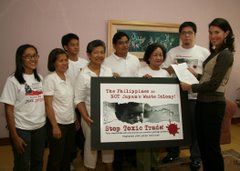
Photo by Gigie Cruz/GAIA.
Ilibing ang JPEPA! Ibangon ang Pilipinas!
Civil society groups call on the Senate to bury the treaty
08 November 2007.
The MJJC, a broad network of civil society groups whose constituents come from sectors that would be most affected by the JPEPA, set up a tableau composed of a number of tombstones for JPEPA and a wreath along with a Grim Reaper at the Senate grounds, and called for the Senate to bring the JPEPA to its final resting place.
Photo by Gigie Cruz/GAIA. “The Senate needs to bury all the lies and representations of the pro-JPEPA panel six feet underground,” said Marie Marciano, steering committee member of the EcoWaste Coalition, a member of the MJJC. “Government officials have been trumpeting the supposed gains that the country will get under this atrocious treaty ad nauseaum through paid newspaper ads, but could not, in fact, prove any of them in all of the hearings that the Senate has so far conducted. It is clear that the JPEPA is in its death throes. Our senators should lay it to rest.”
“The Senate needs to bury all the lies and representations of the pro-JPEPA panel six feet underground,” said Marie Marciano, steering committee member of the EcoWaste Coalition, a member of the MJJC. “Government officials have been trumpeting the supposed gains that the country will get under this atrocious treaty ad nauseaum through paid newspaper ads, but could not, in fact, prove any of them in all of the hearings that the Senate has so far conducted. It is clear that the JPEPA is in its death throes. Our senators should lay it to rest.”
In the past five hearings, the coalition had unquestionably established and proven that the JPEPA’s textual provisions are detrimental to Philippine national interest, consistently showing the treaty’s lopsidedness by comparing it with Japan's Economic Partnership Agreements with other ASEAN countries such as Indonesia, Malaysia, Singapore and Thailand.
“This is really a hideous and horrific deal for the
Photo by Gigie Cruz/GAIA. In their public pronouncements, Committee for Foreign Relations Chair Senator Miriam Defensor Santiago and Vice-chair Senator Mar Roxas expressed their incredulity and disbelief at the outlandish claims of economic benefit and job generation that were being made by JPEPA proponents. Sen. Santiago was quoted as saying that if the government panel could not defend the treaty, then “the JPEPA would be dead.[i]” The senators even praised the oppositors from the MJJC, saying that the Junk JPEPA advocates had established their case with well-reasoned arguments, and with concrete and indisputable evidence.
In their public pronouncements, Committee for Foreign Relations Chair Senator Miriam Defensor Santiago and Vice-chair Senator Mar Roxas expressed their incredulity and disbelief at the outlandish claims of economic benefit and job generation that were being made by JPEPA proponents. Sen. Santiago was quoted as saying that if the government panel could not defend the treaty, then “the JPEPA would be dead.[i]” The senators even praised the oppositors from the MJJC, saying that the Junk JPEPA advocates had established their case with well-reasoned arguments, and with concrete and indisputable evidence.
In today's additional hearing on Trade in Goods and Agriculture, the oppositors from MJJC put forth additional proof to debunk the oft-repeated and hollow claim by JPEPA proponents that the treaty will boost outputs in Philippine agriculture and lead to a boom in exports that will benefit small farmers and fishers, citing the government’s claims that the elimination of tariffs will result in a free flow of agricultural imports and exports between the two countries.
Photo by Gigie Cruz/GAIA. “Zero tariffs will not be imposed on all our agricultural products to
“Zero tariffs will not be imposed on all our agricultural products to
Aside from not agreeing to zero tariffs for most of the agricultural products from the
“They wanted to protect their own local industries,” Atty. Benjamin continued. “
“The dangers of the JPEPA are not the creations of
*END*
More photos:
All photos by Gigie Cruz/GAIA.



[i]“






1 comment:
wow galing ni kamatayan ah! congrats from jakarta here.
Post a Comment